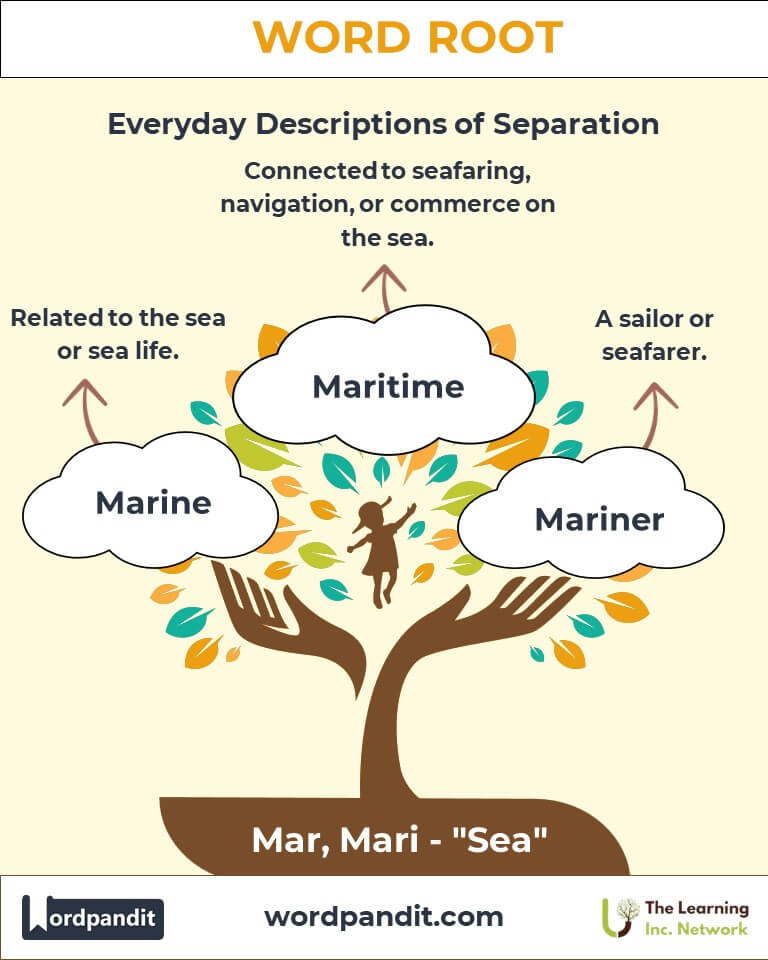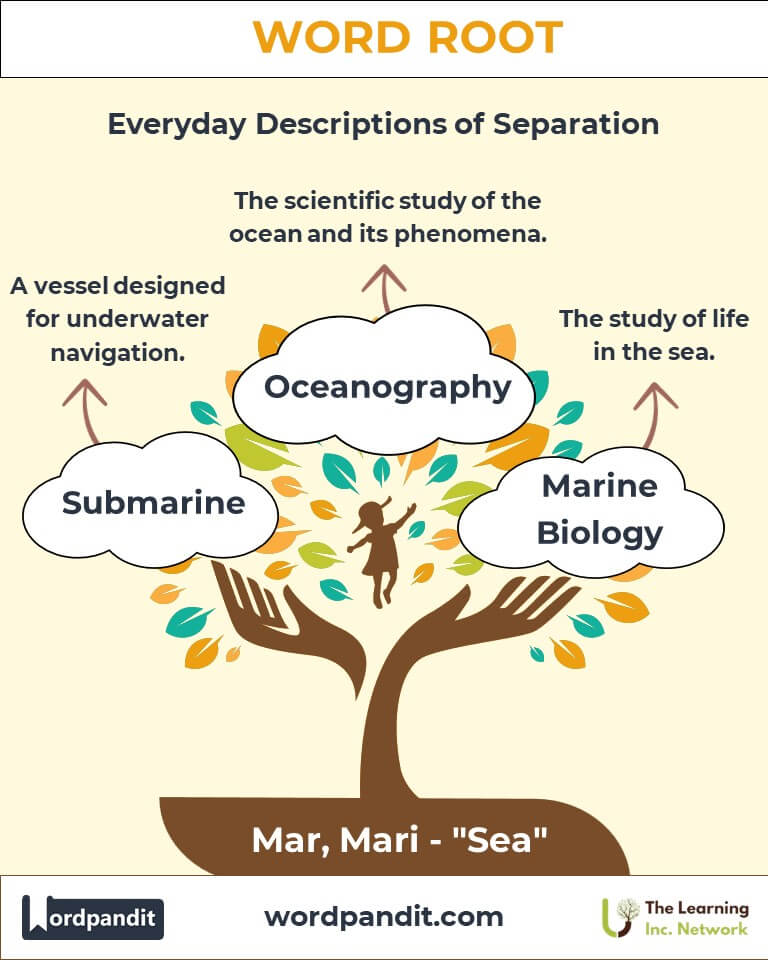Mar, Mari: Exploring the Depths of the Sea in Language and Culture
Byline: Dive into the fascinating origins and applications of the roots "mar" and "mari," derived from the Latin word for "sea." From words like "marine" to "maritime," these roots enrich our understanding of oceanic life, navigation, and more.

Table of Contents
- Introduction: The Essence of Mar and Mari
- Etymology and Historical Journey
- Mnemonic: Unlocking the Power of Mar and Mari
- Common Mar, Mari-Related Terms
- Mar, Mari Through Time
- Mar, Mari in Specialized Fields
- Illustrative Story: Mar in Action
- Cultural Significance of Mar and Mari
- The Mar, Mari Family Tree
- FAQs About the Mar, Mari Word Root
- Test Your Knowledge: Mar, Mari Word Root Quiz
- Conclusion: The Living Legacy of Mar and Mari
Introduction: The Essence of Mar and Mari
Picture the vastness of the ocean, a boundless expanse teeming with life and mystery. The roots "mar" and "mari," pronounced as "mar" and "mar-ee," capture this essence, connecting language to the sea. Derived from Latin, these roots form the basis of terms central to marine biology, navigation, and even mythology, reflecting humanity’s enduring fascination with the ocean.

Etymology and Historical Journey
The roots "mar" and "mari" originate from the Latin word mare, meaning "sea." These roots entered English through Old French and Middle English, retaining their maritime connotations. Historically, they were integral to the vocabulary of sailors, explorers, and cartographers during the Age of Exploration, shaping terms related to seafaring and maritime law.
Mnemonic: Unlocking the Power of Mar and Mari
To remember "mar" and "mari," envision a ship cutting through waves under the shimmering moonlight, symbolizing the ocean’s vast influence.
Mnemonic Device:
“Mar and Mari mirror the sea, guiding ships and enriching vocabulary.”
Common Mar, Mari-Related Terms
- Marine (muh-reen): Related to the sea or sea life.
Example: "Marine ecosystems are vital to the planet’s health." - Maritime (mar-ih-time): Connected to seafaring, navigation, or commerce on the sea.
Example: "The nation’s maritime industry supports global trade." - Mariner (mar-ih-ner): A sailor or seafarer.
Example: "The mariner shared tales of adventures across the seas." - Submarine (sub-muh-reen): A vessel designed for underwater navigation.
Example: "The submarine explored the ocean’s deepest trenches." - Aquamarine (ak-wuh-muh-reen): A blue-green gemstone resembling the color of the sea.
Example: "The aquamarine necklace shimmered like sunlight on water."
Mar, Mari Through Time
- Ancient Usage: In Roman mythology, Neptune (Poseidon in Greek mythology) was revered as the god of the sea, embodying the importance of "mar" in ancient culture.
- Modern Contexts: Words like "marine" have expanded beyond their original nautical focus to include marine biology, addressing ecological concerns like ocean conservation.
Mar, Mari in Specialized Fields
- Marine Biology: The study of life in the sea.
Example: "Marine biologists investigate coral reef ecosystems to protect biodiversity." - Maritime Law: Legal frameworks governing sea navigation and commerce.
Example: "Maritime law ensures the safety and rights of ships and their crews." - Oceanography: The scientific study of the ocean and its phenomena.
Example: "Oceanographers use marine technology to study currents and marine life." - Jewelry and Fashion: Aquamarine gemstones are cherished for their connection to the sea.
Example: "Aquamarine stones symbolize calmness and clarity, inspired by the ocean."
Illustrative Story: Mar in Action
Captain Elena, a seasoned mariner, embarked on a journey to map uncharted waters. Her submarine, equipped with advanced marine technology, ventured deep into the ocean’s mysteries. Along the way, her crew encountered aquamarine-colored bioluminescent creatures, highlighting the wonders of the sea. Elena’s love for maritime adventures inspired her to advocate for marine conservation, ensuring future generations could marvel at the ocean’s beauty.
Cultural Significance of Mar and Mari
From maritime traditions to ocean-inspired art and literature, "mar" and "mari" roots symbolize humanity’s connection to the sea. Celebrations like World Oceans Day remind us of the ocean’s role in sustaining life, while nautical expressions such as "smooth sailing" reveal the deep integration of maritime language into everyday speech.

The Mar, Mari Family Tree
- Aqua (Latin: water):
- Aquatic: Pertaining to water.
Example: "Aquatic sports include swimming and diving." - Naut (Greek: sailor):
- Astronaut: A sailor of the stars.
Example: "The astronaut’s journey mirrored that of ancient mariners." - Hydro (Greek: water):
- Hydrosphere: All the water on Earth.
Example: "The hydrosphere includes oceans, lakes, and rivers."

FAQs About the "Mar, Mari" Word Roots
Q: What do "mar" and "mari" mean, and what is their origin?
A: The roots "mar" and "mari" mean "sea," derived from the Latin word mare. They describe everything related to the ocean, including marine life, navigation, and the natural world of water.
Q: What is marine biology, and why is it important?
A: Marine biology studies life forms in the sea, from microscopic plankton to massive whales. It helps in understanding biodiversity, regulating Earth's climate, and conserving endangered species.
Q: What does maritime law govern?
A: Maritime law, or admiralty law, governs issues like shipping, navigation, marine resources, and crimes on international waters. It ensures fair trade practices and protects marine environments.
Q: Why is aquamarine named after the sea?
A: Aquamarine, a blue-green gemstone, is named for its resemblance to the sea's colors. Historically, it was believed to protect sailors and calm ocean waves.
Q: Who is a mariner, and what roles have they played in history?
A: A mariner is a sailor or seafarer. Mariners have been pivotal in exploration, trade, and cultural exchange, connecting continents and advancing civilization.
Test Your Knowledge: Mar and Mari Word Roots Quiz
1. What does "marine" refer to?
2. Which term describes laws governing sea navigation?
3. What is a mariner?
4. What field studies the ocean’s physical and biological aspects?
5. Which term is derived from "mar" and represents underwater vessels?
Conclusion: The Living Legacy of Mar and Mari
The roots "mar" and "mari" reveal humanity’s enduring connection to the sea, shaping language, science, and culture. As we continue to explore and protect our oceans, these roots remind us of the vast, life-sustaining world beneath the waves. Dive deeper into their meanings and let "mar" and "mari" inspire your journey into the blue.














